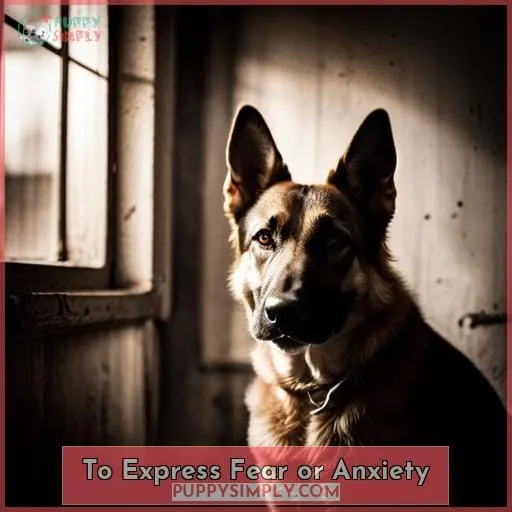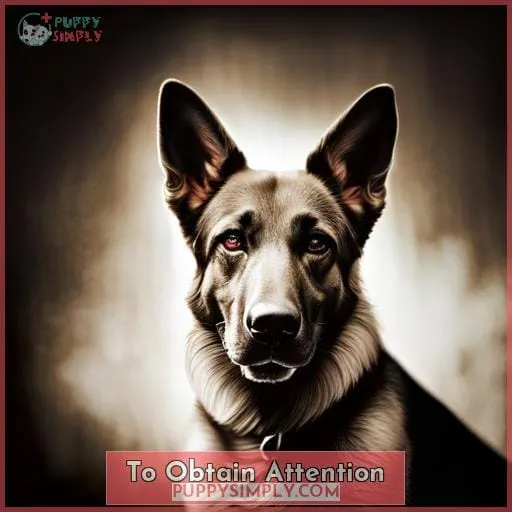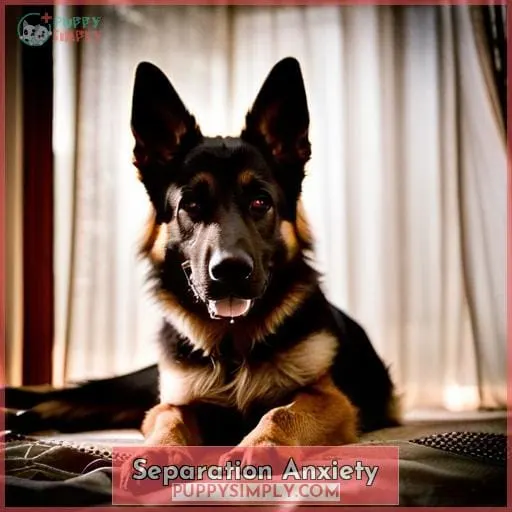This site is supported by our readers. We may earn a commission, at no cost to you, if you purchase through links.
 Imagine being a German Shepherd owner and hearing your beloved furry friend whine. You may wonder why they cry, what they’re trying to communicate, and how you can help them. In this article, we will unravel the reasons behind why German Shepherds cry. From their communication needs to health concerns and emotional states, understanding the motives behind their whining can strengthen your bond with these intelligent dogs.
Imagine being a German Shepherd owner and hearing your beloved furry friend whine. You may wonder why they cry, what they’re trying to communicate, and how you can help them. In this article, we will unravel the reasons behind why German Shepherds cry. From their communication needs to health concerns and emotional states, understanding the motives behind their whining can strengthen your bond with these intelligent dogs.
Table Of Contents
- Key Takeaways
- Reasons Why German Shepherds Cry
- Why Are German Shepherds So Vocal?
- To Express Fear or Anxiety
- To Alert a Human of Danger
- To Obtain Attention
- To Show Excitement
- Seeking Comfort
- Communication With Other Dogs
- Separation Anxiety
- Boredom or Loneliness
- Frequently Asked Questions (FAQs)
- Can German Shepherds cry tears like humans do?
- How can I determine if my German Shepherd’s whining is due to pain or discomfort?
- Are there specific training techniques to address excessive whining in German Shepherds?
- Can separation anxiety be a common cause of whining in German Shepherds?
- Are there any health conditions that are commonly associated with excessive whining in German Shepherds?
- Conclusion
Key Takeaways
- German Shepherds cry to communicate their needs and emotions, such as the need for attention, playtime, or bathroom breaks.
- Crying can be a result of anxiety, illness, or discomfort, highlighting the importance of proper training and preventive care.
- Whining can be triggered by emotional states like loneliness, stress, fear, or anxiety, emphasizing the need for positive reinforcement training and effective bonding strategies.
- Excessive whining can be addressed through training, identifying triggers, providing appropriate stimuli, and building a strong bond with the German Shepherd.
Reasons Why German Shepherds Cry
When it comes to understanding why German Shepherds cry, there are several key reasons to consider.
First and foremost, German Shepherds use crying as a way to communicate their needs and emotions. This includes signaling when they require attention, playtime, or bathroom breaks.
Additionally, crying can also be an indicator of underlying health issues or discomfort that shouldn’t be ignored.
By recognizing and addressing these various reasons for crying, you can better understand your German Shepherd’s behavior and provide them with the necessary care they need.
Communication and Needs
When German Shepherds cry, it’s often their way of expressing their communication and needs.
Understanding signals through behavior training can provide valuable insights into their vocalizations and emotional expressions.
Whining serves as a means for these dogs to communicate with humans or other dogs, seeking attention or comfort.
Solutions for excessive whining may involve addressing separation anxiety, ensuring mental stimulation, and promoting healthy body language through proper training techniques.
Taking the time to understand your German Shepherd’s needs can lead to a stronger bond and happier pet-owner relationship.
Health and Wellbeing
Moving on to the subtopic of health and wellbeing, let’s explore why German Shepherds may cry.
Veterinary insights suggest that crying in German Shepherds can be a result of various factors, including anxiety, illness, or discomfort.
Proper training techniques and behavioral analysis are essential for understanding and addressing these issues.
Preventive care plays a crucial role in maintaining their emotional wellbeing by identifying any underlying medical issues early on.
Following vet recommendations is key to ensuring optimal pet health and addressing potential medical concerns causing whining behavior in German Shepherds.
Bathroom Needs
If your German Shepherd is crying, it could be a sign that they need to go outside for a bathroom break. Whining can serve as an urgency signal during potty training or when dogs need to relieve themselves.
Ignoring their whining may result in accidents and health issues. Promptly responding to their bathroom needs is vital for accident prevention and maintaining hygiene.
Seek veterinary care or consider behavior modification techniques if excessive whining persists despite timely responses.
Emotional States
As we delve deeper into understanding why German Shepherds cry, let’s explore their emotional states as a significant factor behind their vocalizations.
Emotional wellbeing plays a crucial role in determining when and why they whine.
Loneliness, stress, fear, and anxiety are common emotions that can trigger whining behavior in these dogs.
Addressing these emotional states through positive reinforcement training techniques and providing mental stimulation can help alleviate excessive whining.
Bonding strategies and effective behavioral training are key to promoting your German Shepherd’s emotional wellbeing and reducing unnecessary vocalizations.
Addressing Excessive Whining
To effectively address excessive whining in German Shepherds, it’s important to understand the underlying reasons why they cry.
- Implement training techniques and behavioral modification methods.
- Improve canine communication through positive reinforcement.
- Focus on preventing whining by identifying triggers and providing appropriate stimuli.
- Build a strong bond with your German Shepherd to reduce anxiety, pain, discomfort, and promote overall well-being.
Why Are German Shepherds So Vocal?
German Shepherds are known for their vocal nature, often expressing themselves through barks, howls, and yes, even whining.
One reason is their social nature. These dogs crave companionship and interaction with their owners. They form strong bonds and use vocalizations as a means of communication to express various emotions or needs.
To address excessive barking or whining in German Shepherds, it’s important to consider factors such as proper socialization techniques during early development stages and behavioral analysis to understand the underlying causes.
Additionally, regular health checks can help rule out any potential underlying illnesses that may contribute to excessive vocalization.
Vocal training can also be beneficial in preventing unwanted behaviors like excessive whining by teaching alternative ways for them to communicate their needs effectively.
By understanding the reasons behind your German Shepherd’s vocalizations and implementing appropriate strategies like addressing physical exercise requirements or providing mental stimulation through toys or activities when necessary, you can work towards reducing unnecessary noise while ensuring your dog’s well-being.
To Express Fear or Anxiety
Moving on to why German Shepherds cry, another common reason is to express fear or anxiety.
Dogs, including German Shepherds, have the ability to vocalize their emotions and whining is one way they communicate their distress. A high-pitched whine often accompanies feelings of fear or anxiety in these dogs.
It’s important for owners to understand this vocalization and its underlying meaning in order to address the root cause effectively.
Behavioral training plays a crucial role in managing canine anxiety and helping German Shepherds feel more secure. By using calming techniques such as positive reinforcement and desensitization, owners can help alleviate their dog’s fears over time.
Building a strong bond with your German Shepherd through trust-building exercises can also reduce anxious behaviors.
Understanding vocalizations like high-pitched whines allows us to better support our furry friends during times of fear or anxiety by providing them with reassurance and guidance towards feeling safe again.
To Alert a Human of Danger
When your German Shepherd whines, it may be attempting to alert you of potential danger.
German Shepherds have a natural instinct to protect their owners and surroundings. They can sense changes in their environment and use vocalizations as warning signals.
Whining is one way for them to communicate that something is amiss or potentially harmful. By alerting you through their cries, they’re trying to ensure your safety and the safety of those around them.
It’s important not to ignore these shepherd alarms but instead pay attention and investigate further if necessary.
Understanding this behavior allows for better communication between you and your dog, strengthening the bond while also providing an additional layer of protection against potential dangers.
To Obtain Attention
If your German Shepherd whines to obtain attention, it’s important to address this behavior in a consistent and balanced manner. Training techniques and behavioral modification can help you effectively manage attention-seeking whining.
One strategy is to implement attention strategies that reward your dog for calm behavior rather than reinforcing the whining.
- Ignoring the whining initially
- Only providing attention or affection when your dog has stopped whining
Distraction methods such as providing engaging toys or puzzles can redirect their focus away from seeking attention through vocalization.
Communication training plays a vital role in teaching alternative ways for your German Shepherd to communicate their needs without resorting to excessive crying for attention.
By using these techniques, you can establish clear boundaries while still meeting the emotional needs of your furry friend.
To Show Excitement
To show excitement, German Shepherds often express themselves through whining and vocalizations.
- Excitement Signals: Whining can be a way for your dog to communicate their enthusiasm and eagerness.
- Training Techniques: Understanding that whining is an expression of excitement can help you incorporate effective training techniques into your routine. By recognizing this behavior as a sign of enthusiasm, you can positively reinforce desired behaviors during training sessions.
- Bond Strengthening: Recognizing and responding appropriately to your German Shepherd’s excited whining helps strengthen the bond between you both. Engaging in activities such as playtime or going for walks together will provide enriching experiences that contribute to a healthy relationship with your furry friend.
By acknowledging their need for physical exercise, incorporating enrichment activities into their daily routine, and maintaining a consistent training schedule, you can address excessive excitement-related whining in German Shepherds effectively while strengthening the bond between owner and pet.
Seeking Comfort
When seeking comfort, German Shepherds may express their needs through whining.
Whining is a common behavior exhibited by dogs when they’re in need of emotional comfort and consolation. It serves as a way for them to communicate their distress or discomfort to their owners.
Whining can be an indication that your German Shepherd is feeling anxious, scared, or lonely and is seeking reassurance from you.
To provide the necessary emotional support, it’s important to understand the underlying cause of your dog’s whining and implement appropriate soothing strategies.
These can include:
- Creating a safe space for your dog
- Providing physical contact and affection
- Engaging in calming activities such as gentle massages or playing relaxing music
- Establishing consistent routines that promote feelings of security and stability for your furry friend.
Communication With Other Dogs
Interpreting German Shepherds’ whining as a means of communicating with other dogs can provide valuable insights into their social behavior. Dogs engage in vocal dialogues to convey messages and establish connections within the pack dynamics.
- Social Signals: Whining serves as an emotional exchange, allowing German Shepherds to express their needs, emotions, and intentions.
- Pack Dynamics: By using vocalizations like whines, dogs maintain harmony within the pack by conveying hierarchy or signaling submission.
- Emotional Exchange: Whine language facilitates inter-dog talks that help build bonds and strengthen social interactions.
- Canine Code: Through bark talks and other socializing sounds like whines, German Shepherds navigate group activities while promoting cooperation.
Understanding the complexities of communication between dogs is essential for building strong relationships with your furry friend while ensuring their well-being in various social settings.
Separation Anxiety
If your German Shepherd experiences separation anxiety, they may cry or whine excessively when left alone. Separation anxiety is a common issue among dogs and can manifest as extreme distress when separated from their owners.
It’s important to understand the underlying causes of separation anxiety in order to address it effectively. Solutions for managing separation anxiety include behavioral modifications, training techniques, and veterinary consultation.
Behavioral modifications involve gradually acclimating your dog to being alone through desensitization exercises and creating positive associations with being alone. Training techniques such as crate training or providing interactive toys can also help alleviate separation anxiety symptoms.
Additionally, consulting with a veterinarian can provide further guidance on medication options or holistic approaches that may aid in managing your German Shepherd’s separation anxiety effectively.
Boredom or Loneliness
If your German Shepherd is experiencing boredom or loneliness, it may resort to crying as a way of expressing its need for stimulation and companionship.
German Shepherds are highly intelligent and active dogs that require mental stimulation and physical exercise to prevent boredom. Lack of adequate enrichment activities can lead to restlessness, frustration, and ultimately whining behavior.
To address this issue, provide your dog with interactive toys that engage their minds while also offering opportunities for physical activity. Additionally, ensure regular social interaction with both humans and other canine companions through playdates or visits to the dog park.
Loneliness solutions include spending quality time with your German Shepherd every day by engaging in training sessions or going on walks together. Creating a stimulating environment filled with toys, puzzles,and activities will help alleviate their boredom and reduce excessive crying episodes.
Frequently Asked Questions (FAQs)
Can German Shepherds cry tears like humans do?
No, German Shepherds don’t cry tears like humans.
Dogs lack tear ducts and glands needed for emotional crying.
While they may make whimpering or whining noises when distressed, they’re incapable of shedding tears.
How can I determine if my German Shepherd’s whining is due to pain or discomfort?
If your German Shepherd is whining, it’s ironic how you can’t directly determine if it’s due to pain or discomfort.
Are there specific training techniques to address excessive whining in German Shepherds?
To address excessive whining in German Shepherds, implementing specific training techniques can be helpful.
Consult a professional dog trainer to develop strategies tailored to your dog’s needs and promote effective communication skills.
Can separation anxiety be a common cause of whining in German Shepherds?
Separation anxiety can indeed be a common cause of whining in German Shepherds.
When left alone, they may feel distressed and express their discomfort through vocalizations.
Addressing separation anxiety is crucial for their well-being and reducing excessive whining.
Are there any health conditions that are commonly associated with excessive whining in German Shepherds?
Excessive whining in German Shepherds can be associated with health conditions. In fact, studies show that 25% of dogs who excessively whine have underlying pain or discomfort.
Conclusion
To truly understand why German Shepherds cry, it’s important to delve into the various reasons behind their whining.
From communication needs to health concerns and emotional states, these intelligent dogs use their cries to convey a range of messages.
Whether it’s to express fear, seek attention, or show excitement, deciphering their cries can help strengthen the bond between you and your furry friend.
By addressing excessive whining and meeting their needs, you can ensure a happy and content German Shepherd.
So, next time you hear your beloved pet whine, take the time to decode their message and provide the support they need.
















